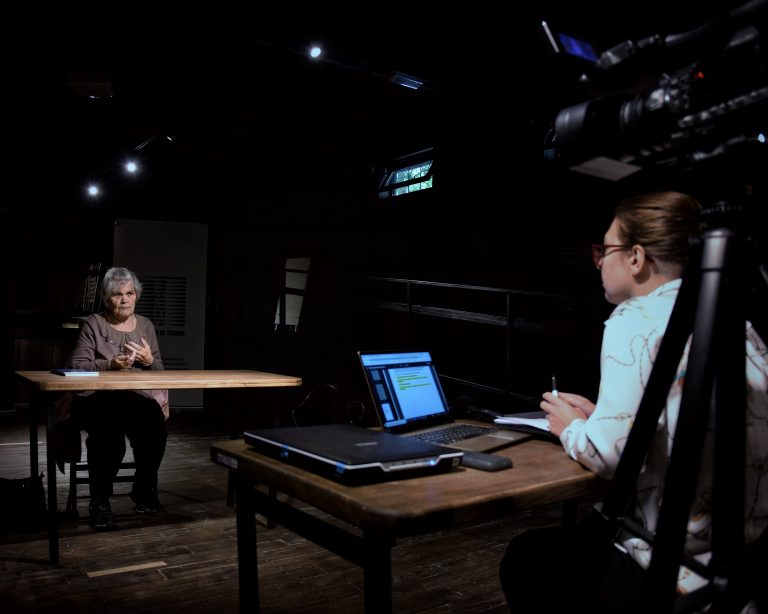Liubomyra Melnyk
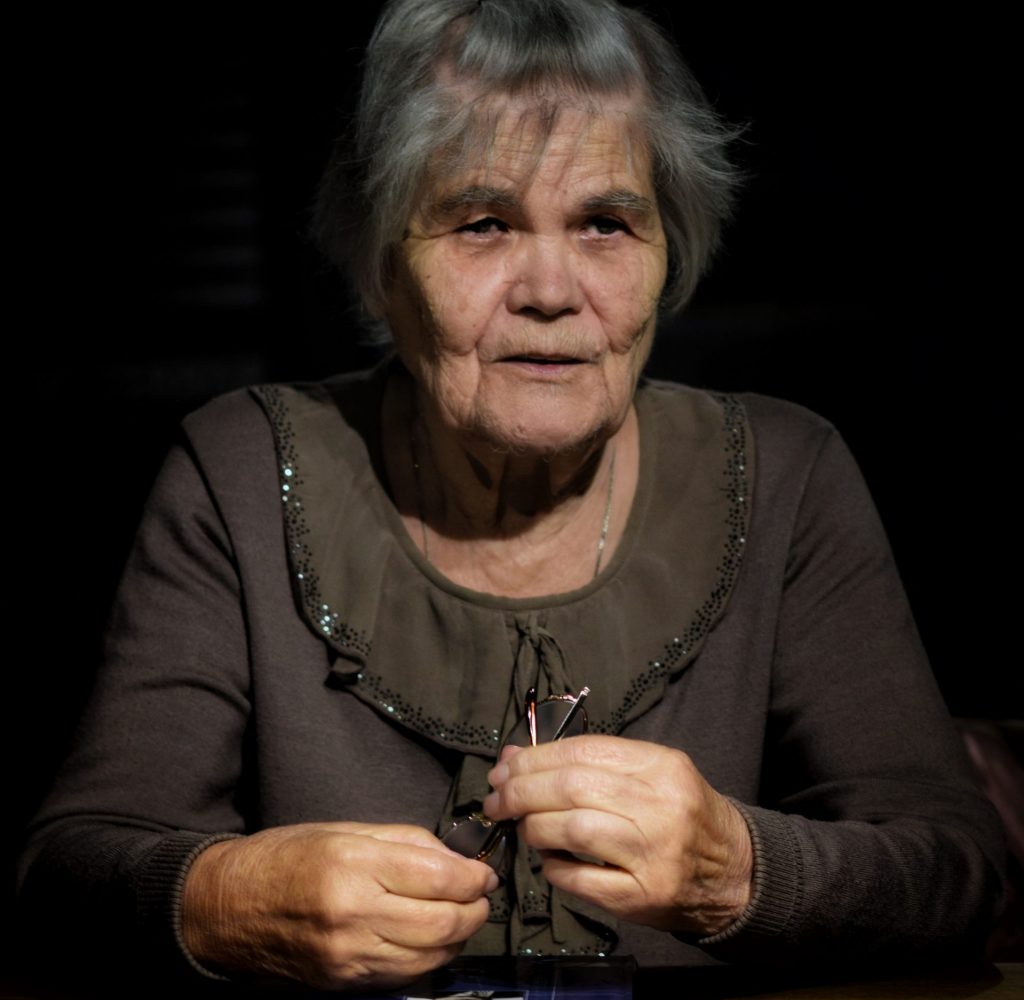
Liubomyra was born on 28 May 1938, in Volia Yakubova village near Drohobych. Her father was born in 1888. He served in the Ukrainian Galician Army, where he caught typhoid and got health issues (he died soon after the deportation to Siberia). His mother was born in 1903; she came from the Stetsiulas house.
There were three other children in the family: Atanas (born in 1928, went abroad in 1944), Mariya (born in 1930) and Zenon (born in 1933).
“Hush your puppy or I’ll shoot her”
A raid to hunt the underground freedom fighters in the village became one of Liubomyra’s brightest childhood memories.
“There was a raid in the village. My father was doing something by the well and they came to him asking if he was hiding someone there. I’ll never forget them holding my dad for half an hour at a gunpoint, with a gun to his forehead… I was weeping. And I’ll never forget my mom taking me in her arms and a soldier talking to her in Russian: “Hush your puppy or I’ll shoot her”. I was a little second-year schoolgirl, but I’ll never forget his words in Russian”.
“Then we were deported” …
On 21 October the family was arrested: They came at dawn, and despite my sister who had said there was going to be a deportation…the parents awaited…everyone was waiting. We packed anything we could, and, like I said, there was no bread, because my mom was planning to bake it on Monday”. In addition to food, they allowed us to take the necessities: “A chest, there were clean coats, some kerchiefs, some clothes and sweaters. We took everything we could. A duvet, even one pillow, there was no place to pack more”.
NKVD [secret police] organised the meeting point in a priest’s house: “They brought us to the so-called plebania [priest’s house]. They kept people from all over the village in the cellar. I remember a Mykhailo Kuryniak was there in that cellar. He returned from Germany back then. He had lots of pictures and he was tearing them”.
“I vaguely remember the trip itself, for I was hungry the entire time”
Soon after that the Kobryns were taken to the Drohobych railway station together with other families. They were transported to Siberia from there. “I vaguely remember the trip itself, for I was hungry the entire time”, says Liubomyra. She remembers only certain moments during the transportation: “They brought us to the station and put us on railway wagons. There was a hole made (…) in the middle of the wagon. It seems that Crimean Tatars were deported using those. We were deported in the same way. It was exactly the same. There was a wagon. A hole was made in the middle. Men put up sheets (…) on both sides”. Many years later Liubomyra’s husband who was also born in Volia Yakubova and lived there, told her that one day in October he was going to school and was surprised to see lots of wheel tracks on the ground.
At the special settlement
In November 1947 the deportees came to Nyzhnia Gubakha village in Molotovska (presently Perm) region, Russian Soviet Federative Socialist Republic. Her father died several months later. Afterwards the family was moved to the outskirts of Verkhnia Gubakha village where they could get a room in an apartment, and later a Finnish house.
It was difficult at the beginning. Mother had money she brought with her, so it saved them from starvation: “There was money, for my mother was selling milk and sour cream and eggs and assorted vegetables, and she sold crops in autumn (…) so there were things to sell. So, we had some money and we could go and buy bread…”. The woman recollects the daily life: “An old man and his wife [our flatmates] were drying potatoes, they were cutting and drying them. They were also drying carrots, potatoes and beans. There were the beans our maternal sister sent us (…). She sent those parcels (…) and we could cook ourselves some food. It was…well. I don’t remember what those potatoes were. We kept cooking them. We were hungry and it was boiling forever”.
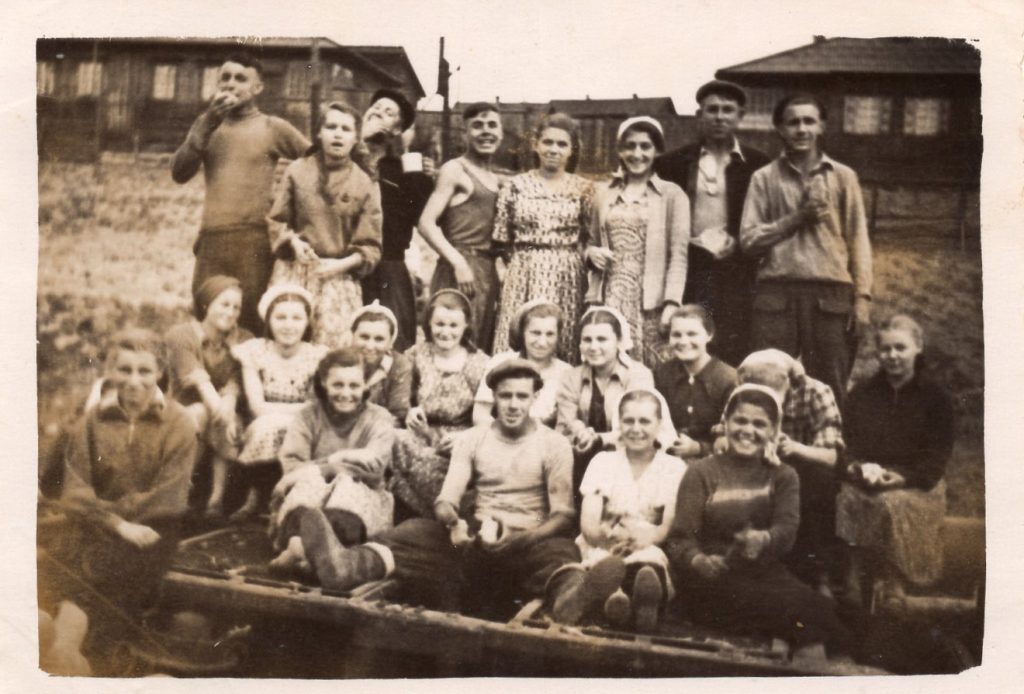
Group photo with classmates (they earned money for graduation) during a lunch break for part-time work at the mine.
However, they ran out of money they brought quite quickly, so his mother and sister got a job: “Then my mother and sister went out to work, for we needed money. Me and my brother were given 300 grams of bread, as we were minors, and my dad and mom got only 200 grams. My sister was working then, so she received a bit more”. Also, Liubomyra recalls: “These were the times that one couldn’t buy bread. Crusty part was cut off. I remember my mother cooking buckwheat. It had to be buckwheat, because we couldn’t afford potatoes. I remember there was American aid (…) canned spam. So we bought that spam and used them to replace meat. People had to queue to buy it. That’s the way it was…”.
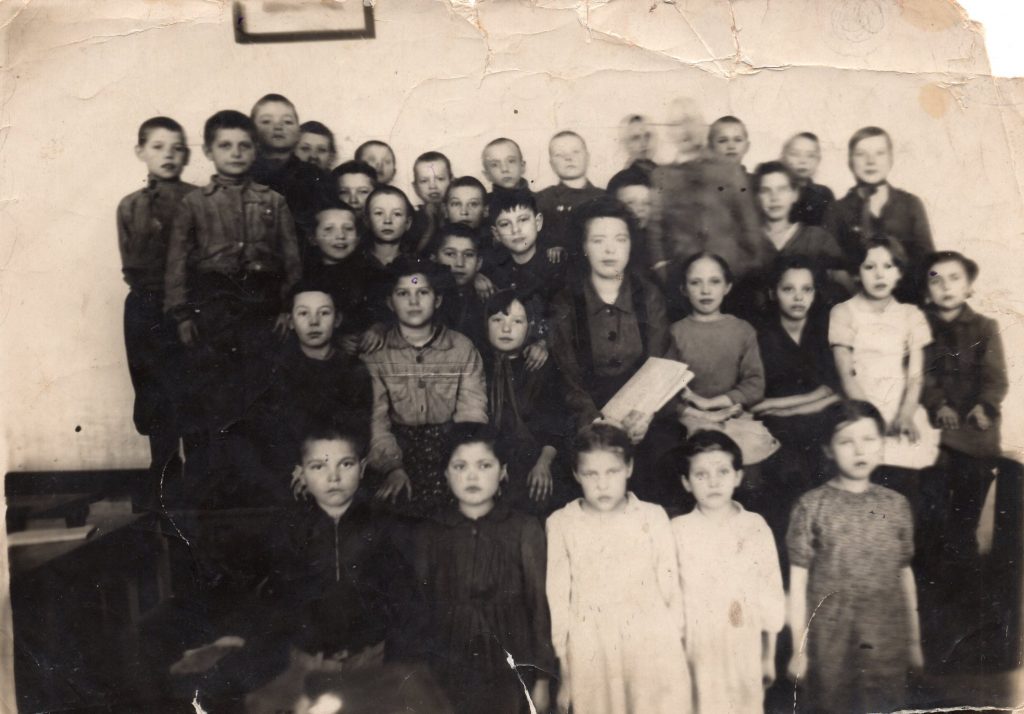
Liubomyra got into school. Then she started working alongside her studies to help her mother and sister: “I was sent to school. It was free of charge until the seventh year, but we had to pay for the eighth, ninth and tenth year (…). Then I started working, for we needed money to afford something…”. The school was challenging at first. Not all teachers and pupils treated the deportees from Western Ukraine kindly: “Well, the school was difficult at the beginning, until the third grade. All lessons were in Russian. We were learning something, but I don’t remember exactly. I was hanging around (…) and engaged with the children a bit. I mispronounced some works and misplaced accents (…). I remember them laughing at me: “Some Banderites always speak like this. Just ignore it”. Well, we were Banderites indeed. Some wanted to have something to do with us and some did not”.
(photo: group photo of 3rd grade students of school №5 in Gubakha, Molotov region (now – Perm region), February 5, 1949. Narrator – I row, second from the left.
Liubomyra was nor accepted to be a pioneer, for she was a deportee. However, she deliberately joined Komsomol: “I couldn’t be a pioneer, for I was a Benderite. I was crying at secondary school. When I was in the 10th grade, my brother told me: “If you don’t enter Komsomol you won’t get anywhere”. Well, then they accepted me to Komsomol”. Lessons at school were exclusively in Russian. “We knew nothing. There were Russian books and I didn’t read anything in Ukrainian. I learned Shevchenko’s “Zapovit” in Russian. Overall, she was brought up according to traditions of that time: “When I was entering university, I was there too, if some meetings took place. We had to go to those rallies, singing Russian songs. I was a typical, as they say, Soviet child. Nothing to be said. I grew up in this environment. (…) I wasn’t then like I feel now”.
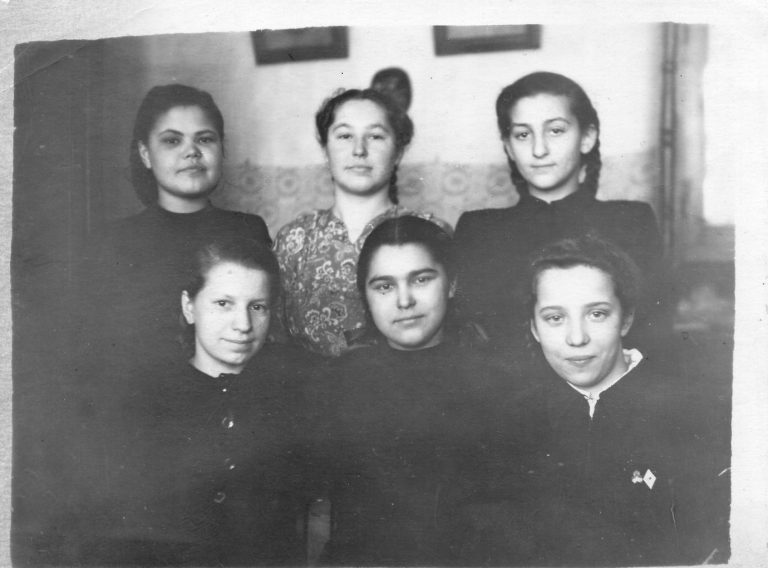
group photo, 7-8 grade, narrator – second row, first from the left, Gubakha, Molotov region (now – Perm region), February 1955
Liubomyra recalls children’s leisure at the special settlement: “We were running around the yard and playing with other children. Still, for as long as I can remember, I was trying to help my mom with the chores all the time (…). What toys could there be? I was 11 or 12, so there was work to be done and my sister was trying to do something as well (?) So she made me help as well… Still, there were no toys”.
In 1956 Liubomyra and her family returned to Ukraine. The trip home took 8 days. Liubomyra couldn’t find work in her sphere (teacher) because of the unofficial status of a deportee. “When I came here, I couldn’t find work for six months. They wouldn’t have me at school. I showed all the documents to the City Board of Education, but they didn’t want me, for it was unclear what and who I was…”. Finally, a director of a data processing centre, a Ukrainian who was deported from Poland in his time, employed her at the statistics department.
